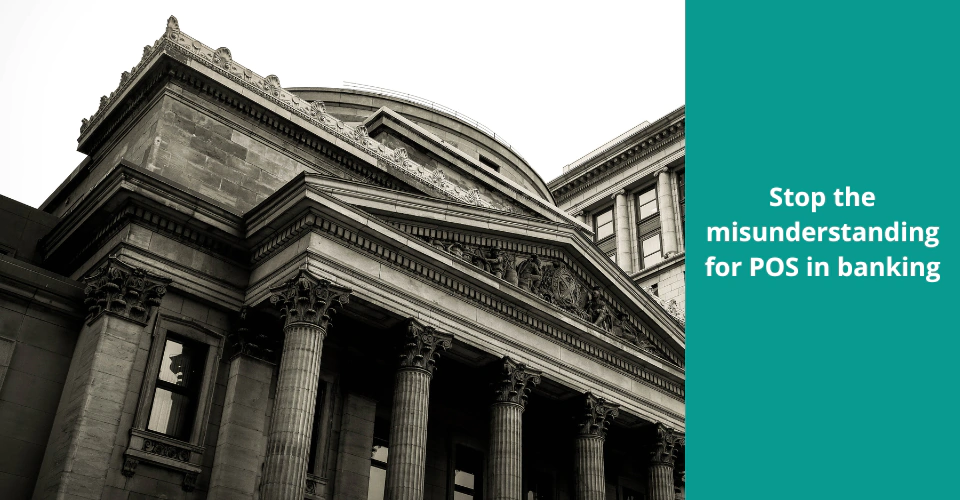POS in banking is an often misleading term, referring to payments and transactions that take place at a bank. However, this is not what it means. So what is the meaning of POS banking? In this article, we would like to provide information to answer this question to help you avoid misunderstanding.
Overview
What does POS mean on a bank statement?
POS banking means you use your debit card to make purchases at a point of sale (POS), such as a cash register or a store POS system. This action is not done at the bank but through the bank.
Point-of-sale – POS systems combine software and equipment to record and complete sales transactions, and shoppers can use a debit card in a POS transaction, the purpose of which is to pay for their bill. The process starts with the cashier putting your card in the reader, and you need to enter your personal identification number (PIN) on a terminal. The POS machine will validate the PIN stored on your card’s chip and verify it online with the data on the chip if your bank account has sufficient funds to complete the purchase.
What is POS debit?
POS debit refers to point-of-sale debit in banking terms. Transactions through POS debit cards in POS banking are using debit cards with PIN code to make purchases.
Any transactions you make at any point of sale will be posted to your account. You can then review the meaning of your POS transaction on your bank statement by the amount spent and sometimes also the name of the store you buy products from.
What is the difference between POS and debit?
POS and debit are two standard terms in POS banking, which will appear on a customer’s statement when they use their debit card at online checkout or in-person cash register.
POS transactions include all transactions made with an ATM or debit card with a terminal known collectively as an access device and authenticated by a PIN or signature.
►►►► Please visit our products: digital banking, situation analysis, Shopify markets, Vietnam Photography Tour, Photography Tour Guide Viet Nam, supply chain operations management, fintech ai, Multi Store POS, Woocommerce POS, Mobile POS, White label POS, POS Reseller, Beauty Supply Store POS, Retail POS and Vape shop POS
However, transactions by debit cards include POS transactions completed with a debit card, as well as signature-authenticated point-of-sale purchases that are routed through the national credit card network.
How do you reconcile a POS transaction?
After explaining the meaning of the term POS banking, one task that should be noted that every retailer and customer should do is reconcile the POS to ensure that the customer’s financial activity is properly recorded.
POS reconciliation is an accounting task; the reconciliation is comparing two sets of data records that match or not. This helps to confirm whether the amount remaining in the account is the same as the amount spent or received. This makes it possible for retail businesses and customers to achieve more accuracy and consistency in their financial records.
To reconcile your POS transaction, first, compare the internal record with your statement, identify the transactions that you cannot cross-reference, and verify the incoming funds on both documents. Next, it is necessary to contact your bank if there is a suspicious error and to maintain a well-balanced set of books.
Why is ConnectPOS your ideal choice?
ConnectPOS is a powerful point-of-sale (POS) system designed specifically for banks to help optimize their banking operations while also providing a superior customer experience. There are several reasons why this software is the best POS system for banks.
Firstly, ConnectPOS is a cloud-based system, meaning it can be accessed from anywhere with an internet connection. This enables banks to provide seamless banking experiences across multiple branches and locations, promoting consistency and ease of use for customers. As all data is stored in the cloud, banks can access it in real-time, allowing them to make informed decisions and offer personalized services.
Secondly, this system is highly customizable, enabling you to tailor the system to your unique requirements. It can be configured to handle an array of banking products and services, such as checking and savings accounts, loans, and mortgages. The system can also be easily integrated with existing banking software and systems.
Thirdly, ConnectPOS provides a range of features that can help streamline banking operations, including automated transaction processing, real-time inventory tracking, and customer relationship management tools. Additionally, the system includes security features, for example, multi-factor authentication, encryption, and hourly backups to protect both customer and bank information.
Besides, ConnectPOS offers a highly intuitive user interface, making it easy for employees to quickly learn and navigate the system. This minimizes training time, increases employee productivity and satisfaction, and ultimately leads to a better customer service experience.
As you can see, ConnectPOS is the best POS system for banks thanks to its cloud-based accessibility, customizable features, operational optimization tools, and intuitive user interface. By choosing it, banks can enjoy improved efficiency, productivity, and customer satisfaction.
Conclusion
Understanding POS banking will help you make more use of it and respond to global POS market trends. Contact us if you are looking for a complete POS system for your business.
Source: Cloud POS
